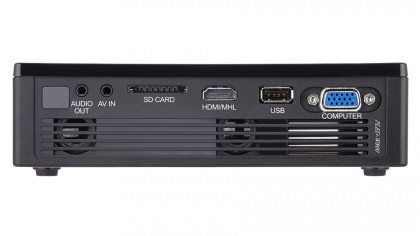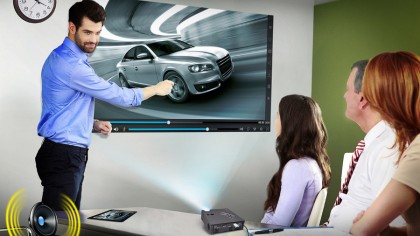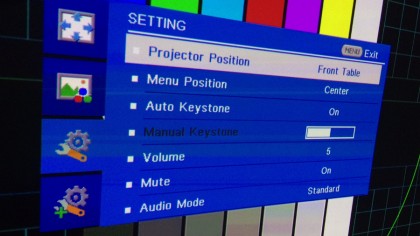TechRadar Verdict
A great value DLP LED projector for portable presentations, but Wi-Fi is by dongle only.
Pros
- +
HDMI, USB & SD card slots
- +
Portable design
- +
Plays PDF and Microsoft files
Cons
- -
Requires Wi-Fi dongle
- -
Underpowered 2W speakers
- -
Lip-sync issue with video
Why you can trust TechRadar
If part of your job means giving PowerPoint presentations in unfamiliar surroundings, the LED projector market has you in its sights. They've been around a few years now, but ViewSonic's latest portable projector seeks to finally set a benchmark between portability and brightness.
No-one is suggesting that you set up the PLED-W800 outside on a sunny day and try to give a lecture, but with a brightness of up to 800 lumens it might just be enough for reliable, bright projections inside.
Just as crucial to its success is this device's sizing. So-called pocket projectors may be tiny, palm-sized gadgets, but their lack of all-important brightness means barely visible projections, which has seen their popularity wane.
However, at 175 x 51.5 x 138mm and weighing 898g, the PLED-W800 is half the size of a netbook (remember them?), and actually ships with a laptop-style soft case. Zipped along three sides, it's stitched halfway across the middle to create one compartment for the PLED-W800 and another for the external (and quite bulky) power-pack and small remote control. It's a high quality case, although when packed-up the whole package does sag in the middle and isn't all that easy to cart around.

Wi-Fi disappointment
Full HD-compatible though sporting a WXGA resolution (1,280 x 800 pixels), the PLED-W800 isn't designed to get every splash of detail from a Blu-ray disc. No, it's game is documents and multimedia – its rear boasts an SD Card slot, a USB slot, an MHL-ready HDMI input (for connecting DVD/Blu-ray players and also smartphones/tablets) and a VGA input for laptops. A Wi-Fi dongle (ViewSonic recommends its PJ-WPD-200) is purely optional, and brings Miracast and DLNA compatibility.
That's fine, but the lack of built-in Wi-Fi is a shame given the popularity of hosting PowerPoint presentations from a tablet. Slightly making up for that is 2GB of on-board storage, which makes it possible to do away with a computer and all peripherals save for the PLED-W800's remote control.
The PLED-W800 retails at around the £535 mark, going by prices online as of the time of writing this review.

Performance
The PLED-W800 is a cinch to setup. Put on a table just 26-inches (66cm) from a wall we got a good 24-inch picture immediately, using the focus wheel to create a sharp, vibrant image in murky, wintery ambient light conditions. In search of the biggest possible image, we made the PLED-W800 (which has a 1.4:1 throw ratio,) project an 80-inch image from 84-inches (2.1m), which is the maximum for good-looking presentations.
File support is excellent. In our test we used the remote to scroll through a list of documents from both a USB stick and an SD Card to display PDF, Word, Excel and PowerPoint files. Learning how to navigate these documents takes a few minutes, but it's possible to zoom in as well as adjust positioning. All files load quickly, and look clean and sharp enough, with text that's easy to read, and white areas of the page are pure. We're not talking eye-searing brightness, but there's enough for a vibrant projection provided you switch off lights and close blinds, though you can stop short of a blackout.

Video files are also supported. The PLED-W800 plays a bevy of file formats including the hi-def MKV container as well as the more regular AVI and MP4. The quality of video is reasonably good, with the projector's 100Hz processing making video fluid enough, though only the Movie mode produces acceptable colours – all the others are too high on contrast, washed-out, far too vivid, or with a lot of solarisation. Choose carefully.
Despite being susceptible to the dreaded 'rainbow effect' from DLP colour wheels, it wasn't much visible to us on the PLED-W800's output. However, we did notice a slight lip-sync issue with audio while watching all three video file formats.
The way video files are treated, however, is otherwise slick – although the PLED-W800's native aspect ratio is 16:10, video files are automatically resized to 16:9, 4:3 and even 21:9, though it's using its 2x digital zoom to perform these resizes.
Jamie is a freelance tech, travel and space journalist based in the UK. He’s been writing regularly for Techradar since it was launched in 2008 and also writes regularly for Forbes, The Telegraph, the South China Morning Post, Sky & Telescope and the Sky At Night magazine as well as other Future titles T3, Digital Camera World, All About Space and Space.com. He also edits two of his own websites, TravGear.com and WhenIsTheNextEclipse.com that reflect his obsession with travel gear and solar eclipse travel. He is the author of A Stargazing Program For Beginners (Springer, 2015),

